
Guests
- Daniel Holzprofessor of physics, astronomy and astrophysics at the University of Chicago, chair of the Science and Security Board of the Bulletin of the Atomic Scientists and the founding director of the University of Chicago Existential Risk Laboratory (XLab).
- David Harringtonviolinist, founder and artistic director of the Grammy Award-winning Kronos Quartet.
On July 16, 1945, the United States carried out the Trinity test, the world’s first nuclear detonation. Today, 80 years later, the University of Chicago — the site of the first self-sustaining nuclear chain reaction — is host to the Nobel Laureate Assembly for the Prevention of Nuclear War, an event that brings Nobel laureates and nuclear experts together to confront the growing global risk of nuclear war. The event features a performance by the award-winning string ensemble Kronos Quartet, who have spearheaded two new renditions of Bob Dylan’s “A Hard Rain’s A-Gonna Fall” featuring nearly 50 more artists from around the world. Titled “Hard Rain” and “Hard Rain (Drone),” the new pieces aim to raise awareness of the ongoing threat of nuclear war.
As the global political situation becomes increasingly unstable, says professor Daniel Holz, chair of the Science and Security Board of the Bulletin of the Atomic Scientists and one of the organizers of the assembly, “the likelihood that we’ll sort of stumble into a nuclear war and the end of civilization … has gone way up.” Holz joins Democracy Now! alongside violinist, artistic director and founder of the Kronos Quartet, David Harrington, to share what inspired them to commission and create “Hard Rain,” which debuts today. “We need everyone in the world to know how dangerous and how awful this is for all of us. And if music and musicians can step up and project those kinds of concerns about all of our futures, then music is doing its job,” says Harrington.
Transcript
AMY GOODMAN: This is Democracy Now!, democracynow.org, The War and Peace Report. I’m Amy Goodman, with Juan González.
Eighty years ago today, July 16, 1945, in the desert of New Mexico, in a place called Alamogordo, the U.S. carried out the world’s first nuclear detonation. Three weeks later, the U.S. would go on to drop atomic bombs on the Japanese cities of Hiroshima and Nagasaki, killing at least an estimated 120,000 people.
The atomic bombs were developed by the secret U.S. government research program called the Manhattan Project. This is J. Robert Oppenheimer, head of the Manhattan Project, sharing his response to that first nuclear explosion in New Mexico 80 years ago today. He spoke in a rarely seen NBC News documentary produced nearly two decades later.
J. ROBERT OPPENHEIMER: We knew the world would not be the same. A few people laughed. A few people cried. Most people were silent. I remembered the line from the Hindu scripture, the Bhagavad Gita. Vishnu is trying to persuade the prince that he should do his duty, and, to impress him, takes on his multi-armed form and says, “Now I am become Death, the destroyer of worlds.” I suppose we all thought that, one way or another.
AMY GOODMAN: Scientist J. Robert Oppenheimer responding to the first nuclear test 80 years ago today.
Three years before that, in 1942, the University of Chicago was the site of the historic first self-sustaining nuclear chain reaction, a key step in the path to creating a nuclear weapon. University of Chicago would go on to host the Bulletin of the Atomic Scientists, which was formed by scientists from the Manhattan Project who were worried about the risks to civilization from nuclear weapons. The group now sets the Doomsday Clock each year as a metaphor for how close humanity is to destruction.
Well, today, there’s a gathering at the University of Chicago to confront the crisis of the increasing risk of nuclear war, called the Nobel Laureate Assembly for the Prevention of Nuclear War, that’s bringing together Nobel Prize-winning scientists, peace activists and musicians. It will culminate with a performance by the Grammy Award-winning Kronos Quartet and the release of two renditions of literature Nobel Laureate Bob Dylan’s “A Hard Rain’s A-Gonna Fall” that feature the band, the quartet, playing with nearly 50 artists from around the world. This is an excerpt.
KRONOS QUARTET & THE HARD RAIN COLLECTIVE: Where hunger is ugly, where the souls are forgotten
Where black is the color, where none is the number
And I’ll tell it and speak it and think it and breathe it
And reflect from the mountain so all souls can see it
Then I’ll stand on the ocean until I start sinkin’
And I’ll know my song well before I start singin’
And it’s a hard, it’s a hard, it’s a hard, it’s a hard
It’s a hard rain’s a-gonna fall
And it’s a hard, it’s a hard, it’s a hard, it’s a hard
It’s a hard rain’s a-gonna fall
AMY GOODMAN: Bob Dylan’s “Hard Rain,” Kronos Quartet and The Hard Rain Collective. It includes Ringo Starr, Iggy Pop, Allison Russell, Willie Nelson, Laurie Anderson and so many dozens of other musicians.
To talk more about how the Nobel Prize team and the Bulletin of Atomic Scientists reached out to the Kronos Quartet with the idea for this project and about this Nobel Laureate Assembly for the Prevention of Nuclear War, we’re joined by David Harrington, violinist, founder and artistic director of the Kronos Quartet, which has focused for over half a century on the intersection of music and activism. Also with us, Daniel Holz, professor of physics, astronomy and astrophysics at the University of Chicago, chair of the Science and Security Board of the Bulletin of the Atomic Scientists. Professor Holz is also founding director of the University of Chicago Existential Risk Laboratory. He’s a co-organizer of the Nobel Laureate Assembly for the Prevention of Nuclear War underway today.
We welcome you both to Democracy Now! Let’s start with Professor Holz. The significance of this day, first, you know, of course, the assembly at the University of Chicago, but what happened 80 years ago and why that is so significant, in the desert of New Mexico?
DANIEL HOLZ: Yeah, so, first, thanks for having me here and for discussing this on such an important day, the 80th anniversary of Trinity.
Trinity was sort of the birth of a new age, the age of nuclear weapons, and we’re still in that age. And the threats that people recognize, that Oppenheimer’s quote that you just played kind of captures, they’re still with us. We now have thousands of these weapons. They’re on high alert. They can go off at any moment. Within an hour, civilization could end. That’s still where we are now.
And so, given that, there’s a sense of urgency that that we need to kind of step back from this brink, as what’s sort of hard to understand is, here we are, 80 years later, and it’s ever more dangerous, that these weapons are still there, threatening us. And so, this whole thing is about trying to find a way to kind of move back away from the possibility of nuclear annihilation.
JUAN GONZÁLEZ: And, Professor Holz, especially now, what’s your sense of what our political leaders have learned over these many decades in terms of nuclear weapons? Of course, we have a president now who, in his first term, withdrew the United States from the Intermediate-Range Nuclear Forces Treaty and withdrew from the Iran nuclear deal, and then, of course, has been risking, with his attacks on Iran, greater problems in terms of the threats of a possible nuclear war to Iran. Could you talk about what our leaders are learning or have learned?
DANIEL HOLZ: Yeah, so, that’s a very important point, which is — and I think all of your audience knows this — the world is becoming much more unstable. There’s a sense that things are deteriorating globally, in many different avenues. And that makes nuclear exchange, nuclear war much more likely. And while this is happening, the awareness of the nuclear threat is decreasing. There are so many things to be distracted by that there’s a tendency for people to focus on other, you know, very significant threats, such as climate change or AI or pandemics, but the nuclear threat is still with us and growing. And I would say, probably since the end of the Cold War, it’s fallen off the radar both of the public and of leadership. And that combination of the risks increasing, the world becoming more unstable and attention to this issue decreasing is particularly alarming, because it means the likelihood that we’ll sort of stumble into a nuclear war and the end of civilization, that that could happen by mistake or miscalculation, has gone way up in the past years, to the point where we’re so alarmed that we’re doing everything we can to kind of draw attention to this risk and try to find ways to mitigate it.
And that’s the whole point of this Nobel laureate assembly. We’re bringing together Nobel laureates and nuclear experts and trying to find a way forward, a way to reduce the risk, get the messages out to the public and also to leaders that here are steps that can be taken to reduce this. We need to get the awareness back, and we need to do everything we can to prevent the sort of nuclear annihilation that would impact literally everyone on the planet. It’s in all of our interests to find a way to reduce these risks and these threats.
AMY GOODMAN: David Harrington, I’d like to bring you into this conversation, founder of the remarkable Kronos Quartet, violinist yourself. If you can talk about this musical collaboration, everyone from Ringo Starr to Willie Nelson to Allison Russell to your own Kronos Quartet? And people may forget the Nobel Laureate Bob Dylan — Patti Smith went to receive the award for him years ago. So, what — why did you choose “Hard Rain”? Talk about the significance back in 1962 of Bob Dylan’s hit.
DAVID HARRINGTON: You know, it’s remarkable that a 21-year-old singer-songwriter wrote this song in 1962 and how — when you observe and know the words of this song very clearly, how important it is to our time right now. And so, when Owen Gaffney from the Nobel Committee asked if Kronos would be interested in reimagining the song, it took me a tenth of a second to say yes.
I didn’t know how much would be involved in doing what we ended up doing, which is probably a good thing, because we had to do this, you know, on tour. We had to do it — to make what we wanted, we needed the whole music community. And we got it. And so, with Elia Einhorn, master producer, we were able to assemble, I think, musicians that represent humanity, in a way that I’m so proud that the music community stepped up. And we get to play tonight. In fact, we’re closing the assembly.
DANIEL HOLZ: That’s right.
DAVID HARRINGTON: And, you know, for music to be in that position, I think, is a good thing. And I’m so happy to be a part of this. And Daniel is such a leader in our world. And for me, this is something I’ve wanted Kronos to be a part of for 52 years, and today we are. And I’m very, very happy about that.
JUAN GONZÁLEZ: And, David Harrington, this cooperation between music and also the scientists involved in this assembly, is it your hope to break through what Daniel Holz is talking about, the lack of attention by the general public to the dangers of nuclear war?
DAVID HARRINGTON: Yes, and the fact that there are very few survivors of Hiroshima and Nagasaki alive right now, and so the people that know absolutely what it’s like to be bombed and be in a nuclear explosion. I think we’re forgetting that this actually happened. And so we need those testimonies, and we need everyone in the world to know how dangerous and how awful this is for all of us. And if music and musicians can step up and project those kinds of concerns about all of our futures, then music is doing its job. And what we need to do as musicians is listen. And when I listen to what’s happening in the world, it’s terrifying, and I want my musical community to do something about it. And this is our first step.
AMY GOODMAN: Well, I want to thank you so much. You were just going to say something, Professor Holz? And then we’re going to wrap up.
DANIEL HOLZ: Yeah, yeah, I was just going to say, I mean, it is so important, because this brings the public into this, the kind of enthusiasm for this. But it also is part of what makes us all hopeful. It’s very inspirational. You listen to the music, you’re kind of captivated. It’s part of, you know, the glory of humanity. It’s what we want to preserve. It’s what we’re all working for. And so, this combination, this way to end the assembly, where we’re spending three days focused on all the bad stuff, all the ways things can go wrong, but also focus on all the opportunities to change course to make things better, the perfect way to end is with the Kronos. So we’re just so excited and honored.
DAVID HARRINGTON: Thank you.
AMY GOODMAN: And how do people, David, have access to this song, “Hard Rain,” written in 1962 right around the time of the Cuban missile crisis?
DAVID HARRINGTON: Yes. Yeah, it came out — this recording came out in its two forms this morning, and it’s released by Red Hot. And I invite everyone to check it out. Turn it up loud, and play it proud.
AMY GOODMAN: Well, I want to thank you both for being with us. We will link to it at democracynow.org. I want to thank David Harrington, who is the violinist and founder, artistic director of the Kronos Quartet, part of The Hard Rain Collective, and professor Daniel Holz, a physicist, a professor of astronomy, astrophysics and physics at the University of Chicago, chair of the Science and Security Board of the Bulletin of Atomic Scientists, co-organizer of the Nobel Laureate Assembly for the Prevention of Nuclear War that’s underway today at the University of Chicago.
When we come back, as ICE raids terrorize immigrant communities around the country, we’ll speak to Teresa Romero. She is the first Latina, first immigrant president of the United Farm Workers of America. Stay with us.
[break]
AMY GOODMAN: “Hard Rain (Drone),” one of the two new versions of Nobel Laureate Bob Dylan’s “Hard Rain” by Kronos Quartet and The Hard Rain Collective of 50 musicians around the world who are performing on this 80th anniversary of the detonation of the nuclear test in Alamogordo, New Mexico, called the Trinity test.

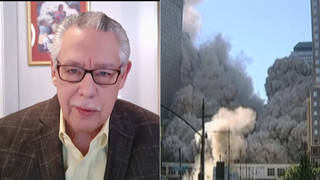
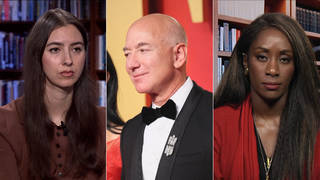
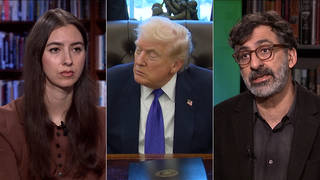
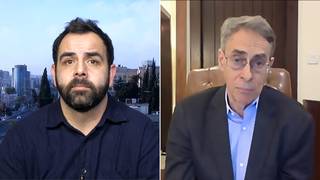







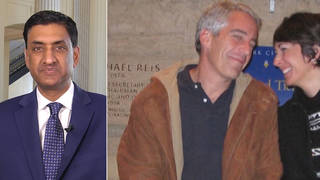
Media Options